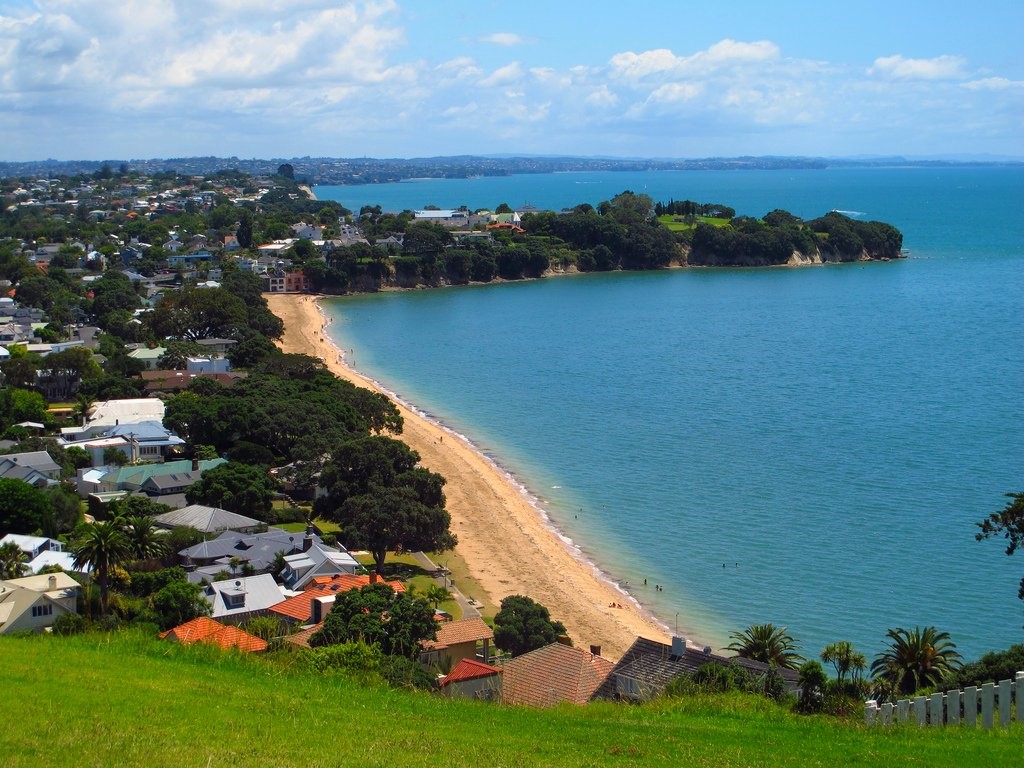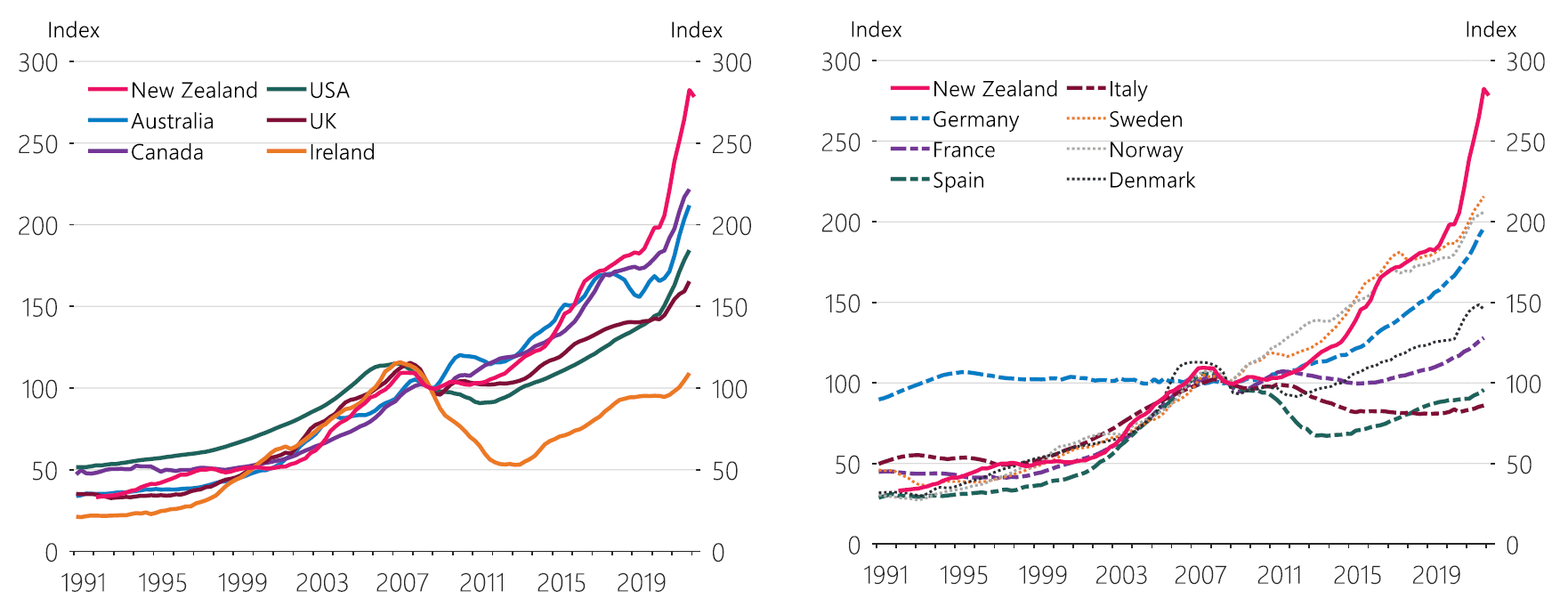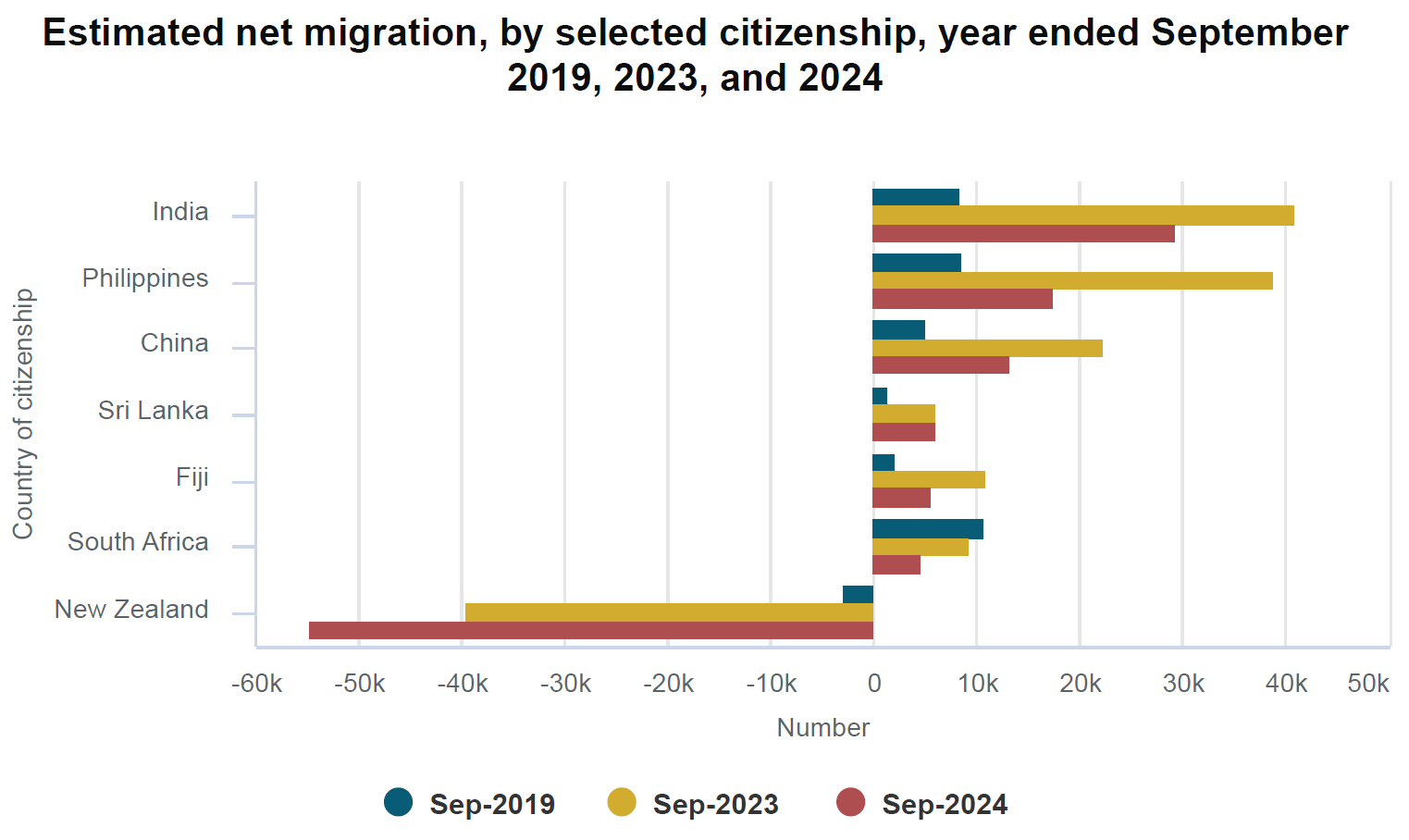You can always learn something from listening.
More than half the people I see in a week weren’t born in New Zealand.
Here on the North Shore, South Africa or China are the most common source countries.
The other weekend, we joined a South African couple for lunch at a fundraiser. He works in financial services. She’s in medicine. It’s interesting to hear their perspective on a country they’ve called home for about a year.
There’s a joy in the safety, low population density, and coastal lifestyle. The many beaches that run from Devonport all the way north are a delight.

Cheltenham Beach. Source: Mark in New Zealand / Flickr
Then there are the negatives. The very high cost of housing. Concerns over race relations, brought to light over the Treaty Principles Bill protests.
Beyond these is something that affects productive migrants more than anything else: regulations holding them up from practicing their profession or moving forward in a business. Often, the rules make no practical sense. It’s a miracle many businesses can even operate, given the regulatory headwinds they face every day.
The medical professional we had lunch with has to be supervised for months to be allowed to gain her practicing certificate. But most clinics here are small and are so busy they can’t allocate supervision time. It’s a catch-22.
This is just one scenario where people find it hard to ‘get their foot in the door’ in New Zealand.
Getting your foot in the door
Becoming established in any country means building a career, and for many, attaining the security of their own home.
The Kiwi dream is fragmented. Those who achieve it have solved the twin hurdles of secure income and secure housing. Housing is challenging, with real NZ home prices about the highest in the world.

Source: Housing Still Matters, RBNZ 2022 / REINZ, OECD
Many migrants will come to New Zealand with plenty of capital. They are often better equipped to navigate these hurdles than younger Kiwis.
So, it is no surprise that in the year to 30 September, 2024, we had record numbers of young Kiwis leaving:
- 177,900 migrant arrivals.
- 133,000 migrant departures.
- Net migration of 44,900.
The main source country for net migration was India:

Source: Stats NZ
Of concern is the estimated net loss of 54,741 New Zealand citizens. Analysis suggests the bulk of these are aged 25 to 34. The prime age when it comes to the dependency ratio:

This has worsened since the 1960s, when there were seven people aged 15-64 for every retiree. Now there are four, and this is dropping.
You can see why we need immigration. Otherwise, you become Italy, where the tax burden is 43% of GDP, and the government is straitjacketed by debt of 144% of GDP.
The young are voting for the solution
When you’re under 35 and trying to make your way, you’re keenly aware of opportunity. Or the lack thereof.
I’m a Generation Xer. I came through at a time dominated by conservatism and free-market economics. Think Thatcher, Reagan, and Roger Douglas.
There was plenty of opportunity in New Zealand up until about the mid-2010s. It may have just been my particular fortunes in the marketplace. But home prices and politics seemed more benign. Following the GFC, John Key’s ‘rock star economy’ became a country primarily for property rock stars.
I worried things were becoming too stretched. That our young children would struggle to afford property as easily as we had. And that the growing levels of equality would soon become divisive. We moved permanently to Europe in 2015.
Opportunities are more individual than country-specific. But sometimes, when opportunities dry up in a country, hardworking people can do better to leave.
When I returned just before Covid, the overreach that followed made this country an even more difficult place to find opportunity. The public service expanded. Regulations and taxes increased. A much larger national debt constrains the 2023 government.
Argentina and Italy — two debt-ridden, regulation-saddled, and high tax countries — demonstrate something: Younger voters won’t tolerate an ongoing demise of opportunity.
Under-35s in these countries voted for governments that woke children in legacy media have labelled ‘far right’.
In Argentina especially, President Milei has taken a ‘chainsaw’ to the octopus-like public service.

Javier Milei. Source: Wikimedia Commons
Recently, JP Morgan raised Argentina’s growth forecast to 8.5%. This would make it one of the world’s fastest-growing economies.
The 2023 New Zealand election saw younger voters and recent migrants come out in support of the right-leaning coalition. Electorates like Auckland’s Mt Roskill — once Labour Party strongholds — shifted dramatically. Today, Mt Roskill’s population is 48.6% Asian.
Is the Coalition delivering?
Compared to the previous government, yes. But that’s a very low bar.
On equality, the Treaty Principles Bill looks to provide an enduring interpretation of the 1840 treaty via referendum. This is useful, since previous governments have added their own ideological takes into legislation. It’s also important for an economy where people want to stay and contribute.
This bill does not look set to gain the support needed from National, NZ First, or any other party beyond ACT. National maintains the bill is simplistic. NZ First that there are no principles in what is essentially a three-clause treaty.
The more practical option may be to remove ‘principles’ from legislation and review electorates as the Royal Commission on the Electoral System recommended in 1986 when MMP was introduced.
Australia has recently gone down a similar path in giving the people their say on democracy, with the Voice referendum.
As for economic management, the pace of tax cuts and deregulation has been slower than we would have liked. Company tax remains among the highest in the OECD. Income tax brackets still lag the rampant inflation the country has experienced.
Meanwhile, taxpayers are still forced to pay for left-wing media outlets and a raft of ministries and initiatives that do little or nothing to expand economic opportunity.
Remember, it can take around six people working in private enterprise to pay for one bureaucrat.
There is the new Ministry of Regulation. This appears to be staffed by high-salaried bureaucrats focused on ‘reviewing’ regulatory settings as opposed to taking a Milei chainsaw to many of them.
In fairness, that ministry is asking for ‘tips’ on areas to look into that are holding back business. You can report a red tape issue here.
As for housing, we covered the Going for Housing Growth policies back in August. The policy changes are expected to be in place by mid-next year.
As we noted, unleashing 30 years of supply could make a decent dent in housing affordability:
There are currently about 540,000 dwellings in Auckland.
The prospect of around another 140,000 sections made available within the Auckland market will make a material difference to supply.
A change in direction does take time, especially under MMP.
New Zealand has not swung to an 8.5% growth forecast as Milei’s Argentina has. Nor do we have the razor focus on efficiency that looks set to be led by Elon Musk and Vivek Ramaswamy’s DOGE (Department of Government Efficiency) initiative in the US.
Don’t stop asking for better. Short-term pain will yield long-term opportunity.
There’s hope now for a better economy. When that takes shape and opportunity beckons, we will see the tide of people leaving turn.
When New Zealand has opportunity again, Kiwis will return.
Regards,
Simon Angelo
Editor, Wealth Morning
(This article is the author’s personal opinion and commentary only. Wealth Morning offers Managed Account Services for Wholesale or Eligible investors as defined in the Financial Markets Conduct Act 2013.)





Simon is the Chief Executive Officer and Publisher at Wealth Morning. He has been investing in the markets since he was 17. He recently spent a couple of years working in the hedge-fund industry in Europe. Before this, he owned an award-winning professional-services business and online-learning company in Auckland for 20 years. He has completed the Certificate in Discretionary Investment Management from the Personal Finance Society (UK), has written a bestselling book, and manages global share portfolios.